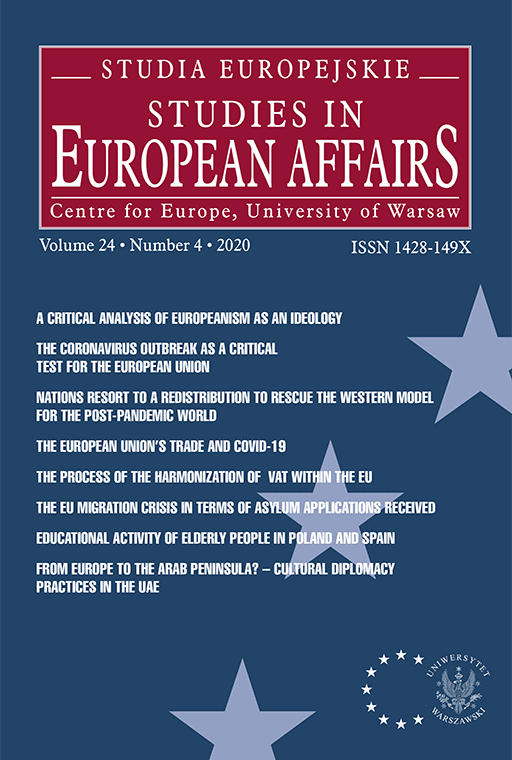
ISSUE: 4/2020
- Volume 24
- Number 4
- 2020
Subscribe NEWSLETTER
Studia Europejskie –
Studies in European Affairs
ISSN: 1428-149X
e-ISSN: 2719-3780
License
Articles published in the journal are under a Creative Commons Attribution – Non Commercial – No Derivatives 4.0 International License
The Evolution of the Process of the Harmonization of Value Added Tax (VAT) Within the European Union
Abstract
The aim of the article is to analyse the process of harmonizing the value added tax (VAT) in the European Union, and in particular the factors behind the decision to build a common VAT system based on the country of destination principle instead of, as initially assumed, the country of origin principle. Characterizing the conditions in which this change in approach took place, the specific features of public finances of these countries were presented, in particular the relation of public expenditure as well as the general level of taxation to GDP. Large differences between EU Member States in this area are one of the main factors making these countries not agree to resign from their sovereignty in shaping taxes. This, in turn, affects the direction and possibilities of the tax harmonization process in the Union, including in the field of VAT. The transitional VAT system operating in the EU since 1993 has been pragmatically adapted to the needs arising from the development of intra-EU trade. Its transformation planned in 2022 to become a new defi nitive system based on the country of destination principle requires the support of Member States for major legislative changes necessary for its implementation.
References
23 May 2019, http://www.rbcvat.com/news/eesc-opinion-definitive-vatsystem/?utm_source=Mondaq&utm_medium=syndication&utm_campaign=View-Original (access 13.11.2019).
Asquith R., EU VAT reforms: trouble ahead?, 21 February 2020, https://www.taxjournal.com/articles/eu-vat-reforms-trouble-ahead- (access 17.06.2020).
Bedri P., Fitore M., The legal framework for harmonization of Value Added Tax (VAT) in European Union, “Acta Universitatis Danubius. Juridica”, t. 13, nr 1/2017.
Council conclusions on the future of VAT, 3167th Economic and Financial Affairs Council meeting Brussels, 15 May 2012, https://www.consilium.europa.eu/uedocs/cms_data/docs/pressdata/en/ecofi n/130257pdf (access 14.11.2019).
Council of the European Union, Report to the European Council on tax issues, Brussels, 5 June 2020. European Commission, Communication from the Commission to the European Parliament, the Council and the European Economic and Social Committee on an action plan on VAT Towards a single EU VAT area – Time to decide, Brussels, 7.4.2016, COM (2016) 148 final.
Gabrizova Z., Tax policy expert: Closing the tax gap can drive political change, 16.10.2019, https://www.euractiv.com/section/economy-jobs/interview/ tax-policy-expert-closing-the-tax-gap-can-drive-political-change/ (access 20.06.2020).
Godar S., Truger A., Shifting priorities in EU tax policies: A stock-taking exercise over three decades, IMK Study, No. 55, Hans-Böckler-Stiftung, Düsseldorf, https://www.econstor.eu/bitstream/10419/191726/1/8869 (access 12.07.2020).
Hangacova N., Stremy T., Value Added Tax and Carousel Fraud Schemes in the European Union and the Slovak Republic, “European Journal of Crime, Criminal Law and Criminal Justice” no. 26, 2018, DOI: https://doi.org/10.1163/15718174-02602005.
Issing O., The European Commission’s Taxing New Idea, Feb 4, 2019, https:// www.project-syndicate.org/commentary/european-commission-taxesqualified-majority-by-otmar-issing-2019-02 (access 3.11.2020).
Jaakkola J., A Democratic Dilemma of European Power to Tax: Reconstructing the Symbiosis Between Taxation and Democracy Beyond the State?, “German Law Journal”, nr 20/2019, DOI: https://doi.org/10.1017/glj.2019.55.
Jones A, EU moves one step closer to DAC7 with anti-fraud tax package, “International Tax Review”, London, July 16, 2020.
Keen M., The anatomy of the VAT, “National Tax Journal”, June 2013, nr 66(2), p. 423, DOI: https://doi.org/10.17310/ntj.2013.2.06.
Krzikallová, K., Tošenovský F., Is the Value Added Tax System Sustainable? The Case of the Czech and Slovak Republics, “Sustainability” Basel, t. 12, nr 12/2020.
Lamensch M., Ceci E., VAT fraud. Economic impact, challenges and policy issues, October 2018, https://www.europarl.europa.eu/cmsdata/156408/VAT%20Fraud%20Study%20publication.pdf (access 13.11.2019).
Leonard M., Europe’s Self-Help Moment, Jun 29, 2020, https://www. project-syndicate.org/commentary/covid19-could-boost-european-cooperation-and-national-sovereignty-by-mark-leonard-2020-06 (access 2.11.2020).
Madariaga A., Neoliberal Resilience: Lessons in Democracy and Development from Latin America and Eastern Europe, Princeton University Press, Princeton 2020.
Milcev A., Casting a glimpse to the future of the VAT system in the EU and Romania, “Romania, E Y. International Tax Review”, London, February 10, 2020.
Oręziak L., Finanse Unii Europejskiej i strefy euro, Oficyna Wydawnicza SGH, Warszawa 2020.
Oręziak L., Konkurencja podatkowa i harmonizacja podatków w ramach Unii Europejskiej. Implikacje dla Polski, Oficyna Wydawnicza Wyższej Szkoły Handlu i Prawa im. Ryszarda Łazarskiego, Warszawa 2007.
Puccio L., Detailed technical measures for the definitive VAT system, BRIEFING EU Legislation in Progress EPRS European Parliamentary Research Service PE 625.184–February 2019, http://www.europarl.europa.eu/egData/etudes/BRIE/2018/625184/EPRS_BRI(2018)625184_EN.pdf (access 13.11.2019).
Schwab K., Global Competitiveness Report 2019, World Economic Forum, 9 October 2019, Geneva 2019, p. xiii, http://www3.weforum.org/docs/WEF_TheGlobalCompetitivenessReport2019.pdf (access 2.11.2020).
Steele L.G., Breznau N., Attitudes toward Redistributive Policy: An Introduction, 28 June 2019, “Societies”, no. 9, vol. 50/2019, DOI: https://doi.org/10.3390/soc9030050.
Terra B., Levying VAT in the EU Customs Union: Towards a Single Indirect Tax Area? The Ordeal of Indirect Tax Harmonisation, “Erasmus Law Review”, vol. 12, issue 3/2019, DOI: https://doi.org/10.5553/ELR.000124.
Tofan M., A Taxation Point of View: Towards a New Level of Integration in the European Union, June 3, 2020, https://www.europenowjournal.org/2020/06/02/a-taxation-point-of-view-towards-a-new-level-of-integration-in-the-european-union/ (access 24.06.2020).
Wilson E., EC urged to roll out a common defi nitive VAT system for services and goods, 23 May 2019, http://www.rbcvat.com/news/eesc-opiniondefinitive-vat-system/?utm_source=Mondaq&utm_medium=syndication &utm_campaign=View-Original (access 13.11.2019).
DOI: 10.33067/SE.4.2020.5
Language: English
Pages: 93-108
How to Cite:
Harvard
Oręziak, L. (2020) "The Evolution of the Process of the Harmonization of Value Added Tax (VAT) Within the European Union". Studia Europejskie – Studies in European Affairs, 4/2020, pp. 93-108. DOI: 10.33067/SE.4.2020.5